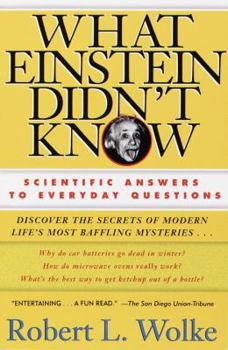What Einstein Didn't Know
Select Format
Select Condition 
Book Overview
Discover how cricket chirps can tell us the temperature, why you can't unburn a match, why ice floats, and a host of mysteries of modern living - including some riddles that maybe even Einstein... This description may be from another edition of this product.
Format:Paperback
Language:English
ISBN:0440508568
ISBN13:9780440508564
Release Date:January 1999
Publisher:Dell Publishing Company
Length:270 Pages
Weight:0.65 lbs.
Dimensions:0.7" x 5.3" x 8.0"
Customer Reviews
5 ratings
Good for kids of all ages
Published by Thriftbooks.com User , 19 years ago
I bought this book for my daughter (12 years), the Indonesian Language version one, and i read it too. It is a good book that explain everyday science in a very easy language. I always believe the real test of good teaching is being able to expain complex fenomena in a simple and interesting way. Some materials are a bit too-basic if you already know a lot, so i think this books suits teenager and good for enticing their curiosity to see everyday happenings in a deeper way. To teach kids how to think more and get them interested in life. One good alternative to the world of "game boy" and all the bell n wistles of computer games ;-) and MTV.
Great books for everyday knowledge
Published by Thriftbooks.com User , 20 years ago
It is winter time in Boston and since I was a kid, I was always curious why people sprinkle salts during the snow. I asked my dad and he told me, it was so "we can walk better with the salt providing some texture on the ground." Well, after reading this book, I now know why my dad is terrible in science. LOL. This book brings up a lot of day-to-day things that we in the Western World take for granted. I admit that I have a deeper appreciation for science and how creative the mind can be. Now I know more about inner working of the events around me. More than that, I feel like I'm smarter, or at least more knowledgeable. Wow. If a book can have that type of impact on me, I have to give it 5 stars.
A real gem
Published by Thriftbooks.com User , 21 years ago
This one started my purchasing spree on all of Robert Wolke books. I've always wanted to read books like these and have never been able to find them.The style is very warm (although sometimes it can be a little over the top cute), and the topics are fascinating to the inquisitive mind. Read a test chapter; if you like the writing style, you're going to love what he has to say about everyday things you always wondered but never knew. Chances are you'll want his other books too.
One of the great Bathroom Readers
Published by Thriftbooks.com User , 22 years ago
This book is great, it kept me entertained for hours. Being curious and not having much science training, this book blew the dust of the stuff I learned (or was supposed to learn) in school. It makes you go "A-ha, of course!" a lot. The author is witty and while he probably takes his job seriously he manages keep the book entertaining throughout. The book explains a lot of stuff that you've probably never thought about and/or take for granted, like, why is oil slippery and water is not even if both are liquids. Sure, this may not be interesting to a chemist but to most other people it is. The explanations are usually short, 1 - 2 pages, which makes it perfect for dipping into on the bus or at the doctor's waiting room (or the bathroom). There's even a few things you can try out yourself at home. There's nothing as beautiful as your own private sunset in a glass of water and milk. "What Einstein Didn't Know" is also a great help to me as a dad. It was great to be able to explain what was happening when my 6-year old son commented on the noise the ice cubes made when I put them in his juice (of course, that triggered a lot of other questions which reminded me to buy the sequel). This is one of those that I'll read again some day.
Reply to ArnoldVL@hotmail.com
Published by Thriftbooks.com User , 26 years ago
I must reply to comments which state that I (the author) am in error regarding mass and energy. I am not. The misunderstanding--that there are no mass changes in chemical reactions--is, unfortunately, widespread. I had hoped that my explanation in the book would dispel this misunderstanding, but alas! Yes, chemical reactions merely rearrange the same atoms. But the energies of these before-and-after arrangements are different, and hence, so are their masses--minutely, to be sure, but different nevertheless. If a chemical reaction gives off or uses up energy, where has that energy came from or went to? Mass, that's where; there's noplace else. So if energy changes, mass must also change. In chemical reactions, the amount of mass-energy transfer is indeed extremely small, but it's there nevertheless. The discussion on pages 226-228 of my book is entirely factual and correct, not an "unnecessary conjecture." I thank Arnold, however, for the other kind words about the book.




